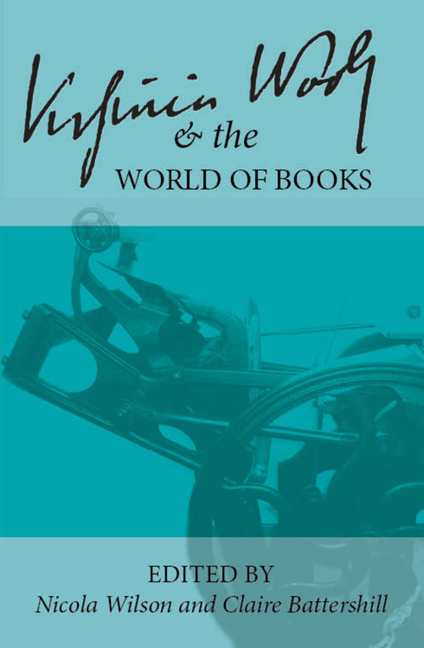 Virginia Woolf and the World of Books
Virginia Woolf and the World of Books Book contents
- Frontmatter
- Contents
- Introduction
- List of Abbreviations
- Keynote
- In the Archives
- Craftsmanship
- The Hogarth Press
- Hours in A Library
- The Art of the Book
- Ekphrastic Writing, Illusive Illustration: Vanessa Bell's Embroideries for Virginia Woolf's “Kew Gardens”
- “The active and the contemplative”: Charles Mauron, Virginia Woolf, and Roger Fry
- Vanessa Bell's “tiny book”: Woolf, Impressionism, Roger Fry, and Anti-Semitism
- The Art of the Narrative
- Making New Books: Creative Approaches
- The Book in the World: Woolf's Global Reception
- Editing and Teaching Woolf
- Intertextuality
- Lives in Writing
- Notes on Contributors
Vanessa Bell's “tiny book”: Woolf, Impressionism, Roger Fry, and Anti-Semitism
from The Art of the Book
- Frontmatter
- Contents
- Introduction
- List of Abbreviations
- Keynote
- In the Archives
- Craftsmanship
- The Hogarth Press
- Hours in A Library
- The Art of the Book
- Ekphrastic Writing, Illusive Illustration: Vanessa Bell's Embroideries for Virginia Woolf's “Kew Gardens”
- “The active and the contemplative”: Charles Mauron, Virginia Woolf, and Roger Fry
- Vanessa Bell's “tiny book”: Woolf, Impressionism, Roger Fry, and Anti-Semitism
- The Art of the Narrative
- Making New Books: Creative Approaches
- The Book in the World: Woolf's Global Reception
- Editing and Teaching Woolf
- Intertextuality
- Lives in Writing
- Notes on Contributors
Summary
In “Virginia Woolf and the Jews,” a special issue of Woolf Studies Annual, Beth Rosenberg argues that “the time has come for critical discussion of Woolf 's relation to Jews and Jewishness to turn to the earlier years of Woolf 's intellectual development, the years before her marriage to Leonard” (9). Two of these key years were 1904–5. Although we have Woolf 's 1939 retrospective view in “A Sketch of the Past,” an equally significant account is by Vanessa Bell. In “Memories of Roger Fry,” Bell talks about 1904–5, Impressionism, and the importance of Camille Mauclair's “tiny book” The French Impressionists to her in those years (129). Bell was interested in politics, as her painting The Triple Alliance (referencing war-time treaties), and the naming of her 1913 Omega textile White after Amber Blanco-White, feminist and political activist, demonstrate. Yet, as I shall argue, in 1904–5 Bell seems to disregard the political subtext of Mauclair's The French Impressionists.
Following the move to Bloomsbury in 1904, Virginia records that so busy were the sisters “we had only just time to rush off to a Mr Rutter's lecture on Impressionism at the Grafton Gallery” (MOB 185). Their interest was triggered by Mauclair's book, translated in 1903, which Bell claims was “her chief source of knowledge of all that was going on in France” (129). Mauclair's “tiny book” inspired her, as she “poured over those absurd little reproductions” (129).
I'll return to Mauclair and Jewishness in a moment, but first to contextualize Vanessa and Virginia's interest. Impressionism derives from the title of Monet's Impressions: soleil levant, scorned when first exhibited in 1874, and the term applied initially to Monet, Pissaro and Sisley (Flint 14). The three were in England in 1870–71 due to the Franco-Prussian war and the Commune, and from 1887 Impressionist works were exhibited annually in the UK, culminating in the major exhibition of 1905 by Durand-Ruel at the Grafton Gallery, referred to by Woolf, which 11,000 people visited. As Brandon Taylor argues, Impressionism trained spectators to the cognitive pleasures of art not just to what content they might be seeing (xix).
- Type
- Chapter
- Information
- Virginia Woolf and the World of BooksSelected Papers from the Twenty-seventh Annual International Conference on Virginia Woolf, pp. 135 - 140Publisher: Liverpool University PressPrint publication year: 2018


